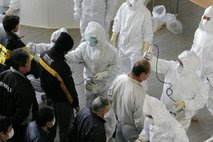 |
| Photo by REUTERS/Asahi Shimbun |
Yesterday’s news that Japan’s nuclear crisis appears to be spinning out of control only adds to the myriad of concerns I have for Japan and its people. The thought of more than 10,000 people dead, which is more than eight times the death toll of Hurricane Katrina, is stifling enough. I can’t imagine the devastation that could result if the nuclear crisis escalates.
Two years ago when the landslides and typhoons hit the Philippines, similar feelings of concern ran through me as they do today. This time it’s much different. This time, the people being affected are not Filipinos, but they are from a country I deeply respect.
I was at the gym the other day exercising while watching three television screens displaying horrific images of the disaster. There were thirty other people on treadmills looking at the eight screens above, but only a handful, including myself, chose to watch the news of the devastation in Japan. Sadly, the others were more interested in watching sports highlights and Hollywood shows about Justin Beiber and Charlie Sheen. The sight stung more than the sweat that kept entering my eyes.
“How can I help?” I asked myself. Part of me wanted to leave to volunteer in search and rescue missions, as was being at the time. Part of me wished I had extra money to send to victims. Part of me wanted to organize a fundraiser like before. Part of me wished my book could be published this month so I can donate a percentage to victims, and so on.
After reality and my priorities were just about to rule everything out and leave me feeling helpless, the sight of a lady closing her eyes and bowing in prayer-like fashion reminded of the power of prayer. She reminded me that despite one’s limitations, one should pray. For some reason, I still felt that prayer without action, especially when one has the ability to act, is an empty prayer. Then I was quickly reminded of my love for writing and decided to shed more light on a particular aspect of the Japanese culture that inspires me.
 |
| Victims gathered around fireplace |
As I write this, I am very much aware of all media surrounding the disaster that touts how Americans and other nations are flooding Japan with support and aid, and I admire this fact. It is a strong testament to the good that still exists within the human race, and is also evidence that unity is still possible. For me though, there is something more admirable and inspiring happening amidst all this disaster than the help coming from the outside of Japan.
 |
| Japanese forming orderly line for kerosene |
For some reason, crime has always been associated with natural disasters, but how can such a tragedy of this magnitude result in much different behavior from those within its grasp? The answer has much to do with culture. Today’s Japanese has both good and bad ingrained in their culture. Since the end of WWII, they have chosen never to repeat the unspeakable of their past, and the result of their decisions thus far reflects on the culture that flowers in the dark soil of their tragedy today.
During my last visit to Kyoto, Japan in 1997, I recall an analogy told to me once by an American who married a Japanese woman and has been living there for fourteen years. He said something to the degree that the Japanese are like the passengers of ship embarked on a long voyage around the world, and Americans are like people on a ferry boat going from one side to another. The Japanese passengers are well aware of the long duration and seek to become as humanitarian as possible amongst each other. They seek not to make enemies or cause trouble, but to maintain an orderly sense of unity. Americans on the other hand, know their boat ride is short and that they will probably not see the other passengers again. Rather than having the same outlook as the Japanese, they tend to have a “looking out for myself” or “take, take, take and prosper” attitude. When I first heard this, I didn’t know enough about the Japanese to give my opinion on his analogy, which I’ve heard several times more since then. Today, I would have to agree with him in a very general sense, though I believe there are many more good Americans than there are bad.
 |
| Patiently waiting in line for relief supplies |
Every culture stands to learn a valuable lesson from the examples taking place right now within the Japanese people who are directly involved in this devastation. It would be great if their sense of unity and affinity for each other were exemplified by every ethnic majority and minority. Strangely enough, when I think of them, I think about my Igorot culture and how we share that sense of unity, despite our war-filled history between tribes. It makes me more appreciative of my roots and ancestry, and yes, I dare say that our cultural bond is something all Filipinos and other cultures can also admire.

